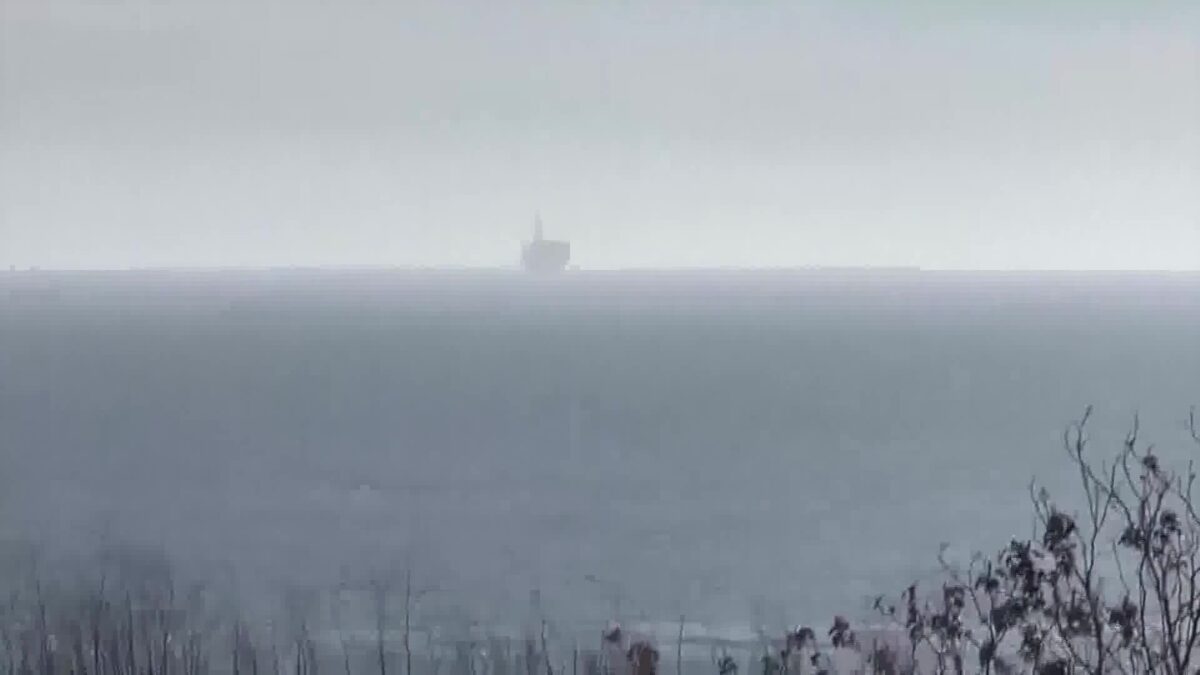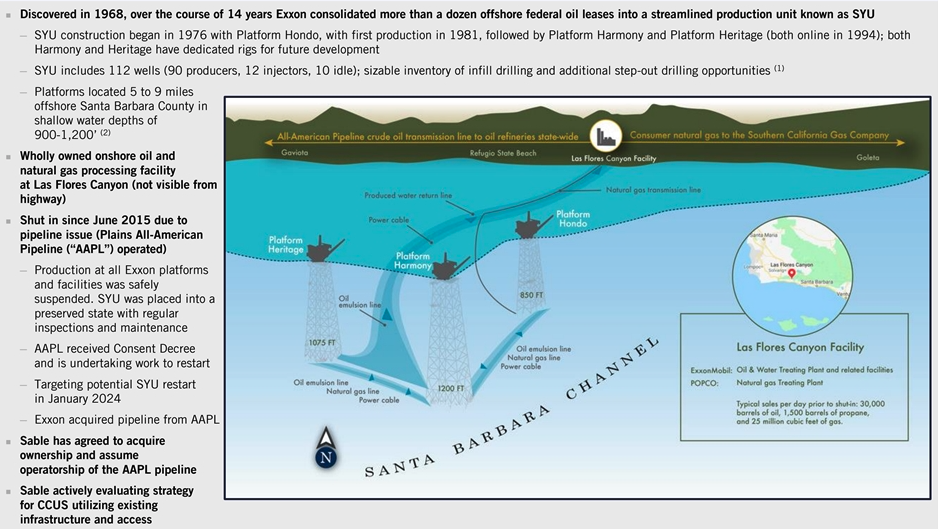Judge allows environmental groups to join lawsuit over lease transfers to Sable Offshore as Interior Department celebrates restarting oil production

Andrew Gillies
SANTA BARBARA COUNTY, Calif. – On Friday, a federal court allowed five local environmental groups to intervene in a lawsuit between Sable Offshore and the County of Santa Barbara regarding the transfer of leases necessary to restart oil production at the Santa Ynez Unit as the U.S. Department of Interior celebrated restarting oil production in Santa Barbara County the same day.
 Stylized depiction of the Santa Ynez Unit courtesy of the U.S. Securities and Exchange Commission.
Stylized depiction of the Santa Ynez Unit courtesy of the U.S. Securities and Exchange Commission.
“The [U.S. District] Court’s decision gives the nonprofit groups a voice in the case, ensuring the Court is able to hear environmental and community perspectives—not just those of the fossil fuel industry and the County,” said the Environmental Defense Center [a party to the intervention application] Executive Director Alex Katz about Friday’s decision.
Friday’s decision set deadlines for for respondents on Aug. 4, 2025 and for petitioners by Aug. 25, 2025.
In February of 2024, ExxonMobil sold existing infrastructure to produce oil in Santa Barbara County which included 114 wells, three offshore platforms, and an onshore oil and gas processing facility at Las Flores Canyon collectively called the Santa Ynez Unit to Sable Offshore for $625,000,000.
 Informational slide detailing the Santa Ynez Unit from an investor presentation by Sable Offshore courtesy of the U.S. Securities and Exchange Commission.
Informational slide detailing the Santa Ynez Unit from an investor presentation by Sable Offshore courtesy of the U.S. Securities and Exchange Commission.
According to court documents, Sable secured a $622,000,000 loan from Exxon to fund the purchase.
Sable Offshore then submitted a Change of Owner, Operator, and Guarantor application with the County of Santa Barbara’s Planning Commission and on October 30, 2024, the Santa Barbara County Planning Commission held a public hearing on the application and voted three to one to approve the lease transfers.
The permit transfers from ExxonMobil to Sable Offshore are a key step for the Houston-based company to restart oil extraction from three offshore platforms, transportation through associated pipelines, and a refinement facility that have all been dormant since the 2015 Refugio oil spill.
At the time, community members and local environmental groups opposed the transfer decision and vowed to continue their opposition noting that County Code Chapter 25B allows for the review by the full Board of Supervisors of Final Development Permits transferred by the Planning Commission following a change in ownership.
“Chapter 25B does not merely provide for the transfer of FDPs [Final Development Permits], it creates an administrative process designed to bar the transfer of FDPs to a transferee that would place the environment at risk,” explained the District Court’s decision Friday. “[A]s a practical matter, Sable cannot restart oil and gas processing and transport in the facilities and pipeline without an FDP.”
During a hearing before the full Board of Supervisors in February about the Planning Commission’s transfer approval, the Board came to a final vote of two denials of the appeals from Supervisors Lavignino and Nelson versus two votes to approve the appeals from Supervisors Capps and Lee with one voting member, Supervisor Hartmann, recusing herself as her home in Buellton has an associated pipeline running adjacent to her property.
According to procedural rules for the Board of Supervisors, the Board can not take an action without three votes meaning the appeal of the approved transfer was neither approved nor denied.
County spokesperson Kelsey Buttitta explained that the deadlocked result as, “It [the appeals of the Planning Commission’s approval] hasn’t been approved or denied. It’s now up to Sable to decide what to do next.”
In February and April of this year, Sable Offshore sent two letters arguing that the County should transfer the permits and if the County did not, the company would seek a solution in court.
“The Santa Barbara County Planning Commission approved the change of owner, operator andguarantor last fall, and the efforts to overturn that ruling failed at the Santa Barbara County Board of Supervisors earlier this year,” said Sable Offshore’s Vice President on Environmental and Governmental Affairs Steve Rusch. “The law is clear. The Planning Commission approved the permit transfer and its decision stands. Because the permits have yet to be transferred, Sable has asked a court to intervene and transfer the permits without delay.”
While the County acknowledged receipt of the letters, it decided after a closed session on April 16, 2025, to take no reportable action and on May 8, Sable Offshore filed a lawsuit alleging that the County of Santa Barbara’s Board of Supervisors failed to comply with County’s Petroleum Code and violated sections of the U.S. and California Constitutions.
Sable Offshore previously reached a conditional settlement agreement on Aug. 30, 2024, with Santa Barbara County waiving County-specific safety requirements and the energy company is currently engaged in a lawsuit against regulatory hurdles and penalties imposed by the California Coastal Commission regarding work done in the Coastal Zone necessary to restart oil production as well as a warning that public claims to have restarted oil production already may have violated leases issued by the California State Lands Commission.
“The press release appears to mischaracterize the nature of recent activities, causing significant public confusion and raising questions regarding Sable’s intentions,” read the State Lands Commission’s letter issued days after the May 19 announcement. “[State Lands] Commission staff has informed me [Lt. Governor of California and Chair of the California State Lands Commission Eleni Kounalakis] that the limited volume oil flows are the result of well-testing procedures required by the Bureau of Safety and Environmental Enforcement prior to restart. These activities do not constitute a resumption of commercial production or a full restart of the SYU [Santa Ynez Unit]. Characterizing testing activities as a restart of operations is not only misleading but also highly inappropriate – particularly given that Sable has not obtained the necessary regulatory approvals to fully resume operations at SYU.”
Despite the warning about potential violations of State Lands Commission’s leases, the U.S. Department of Interior celebrated the restart of oil production in a press release Friday, July 25, 2025, stating, “With production now underway at Sable’s Platform Harmony, the Interior’s Bureau of Safety and Environmental Enforcement (BSEE) continues to work with Sable to bring additional production online. Preproduction inspections for Platform Heritage are set to begin soon and will mark the second SYU platform to come online, targeting an October 2025 timeframe. This could introduce approximately an additional 10,000 barrels/day into production once the second platform is fully operational.”
“Before resuming oil pipeline operations, Lessee shall conduct oil emulsion pipeline inspections and adhere to reporting requirements, as described below,” stated Amended State Lands Commission Lease number 7163. “Each of the inspection methods described below shall bе performed no earlier than twelve months prior to the restart of pipeline production operations. This applies regardless of whether Lessee is in compliance with inspection intervals provided for by regulation.”
“The willful disregard for the directives of regulatory agencies does not engender trust or confidence in Sable’s willingness to serve as a responsible partner, and could weigh significantly into considerations on the future assignment of the SYU leases from Exxon to Sable…no new offshore oil and gas pipeline leases will be considered, including leases 7163 and 4997, which will expire on January 31, 2029 and December 31, 2028, respectively,” warned a May 23 letter from Lt. Governor Kounalakis, Chair of the State Lands Commission.
A spokesperson on behalf of the State Lands Commission shared on Monday in response to Your News Channel’s inquires that nothing has changed regarding the sentiments expressed in the above letter from the Lt. Governor back in May.
“[The U.S. Department of the] Interior anticipates all three platforms in the SYU [Santa Ynez Unit] to be online by the end of 2025, bringing a very successful completion to what has been 10 years of no oil production in the Pacific to essentially full production in just a matter of months, which is an excellent testament to President Trump and Secretary Burgum’s drive towards Unleashing American Energy,” continued the Interior Department’s July 25 press release.
“This is a deeply concerning development for Central Coast residents, many of whom vividly remember the devastating impacts of the 1969 Santa Barbara and 2015 Refugio oil spills, from oil-slicked beaches to the piles of dead marine wildlife,” said Representative Salud Carbajal in a press release Monday. “Time and time again, our community has experienced the acute dangers that come with Big Oil’s reckless extraction practices, which jeopardize our coastal ecosystems, public health, and outdoor recreation economy. And let’s be clear: if energy independence were truly the goal, the current Administration would be investing in cleaner—and often more affordable—energy sources like solar and wind, not gutting their federal support. Restarting these rigs only enriches Big Oil, while sacrificing the Central Coast’s environmental and public health. I will continue working with state and local partners to fight back against efforts to expand offshore oil drilling on the Central Coast.”
Your News Channel has reached out to Sable Offshore, the California State Lands Commission, and the Office of Lt. Governor Kounalakis for more information and their respective responses will be added to this article when they are received.